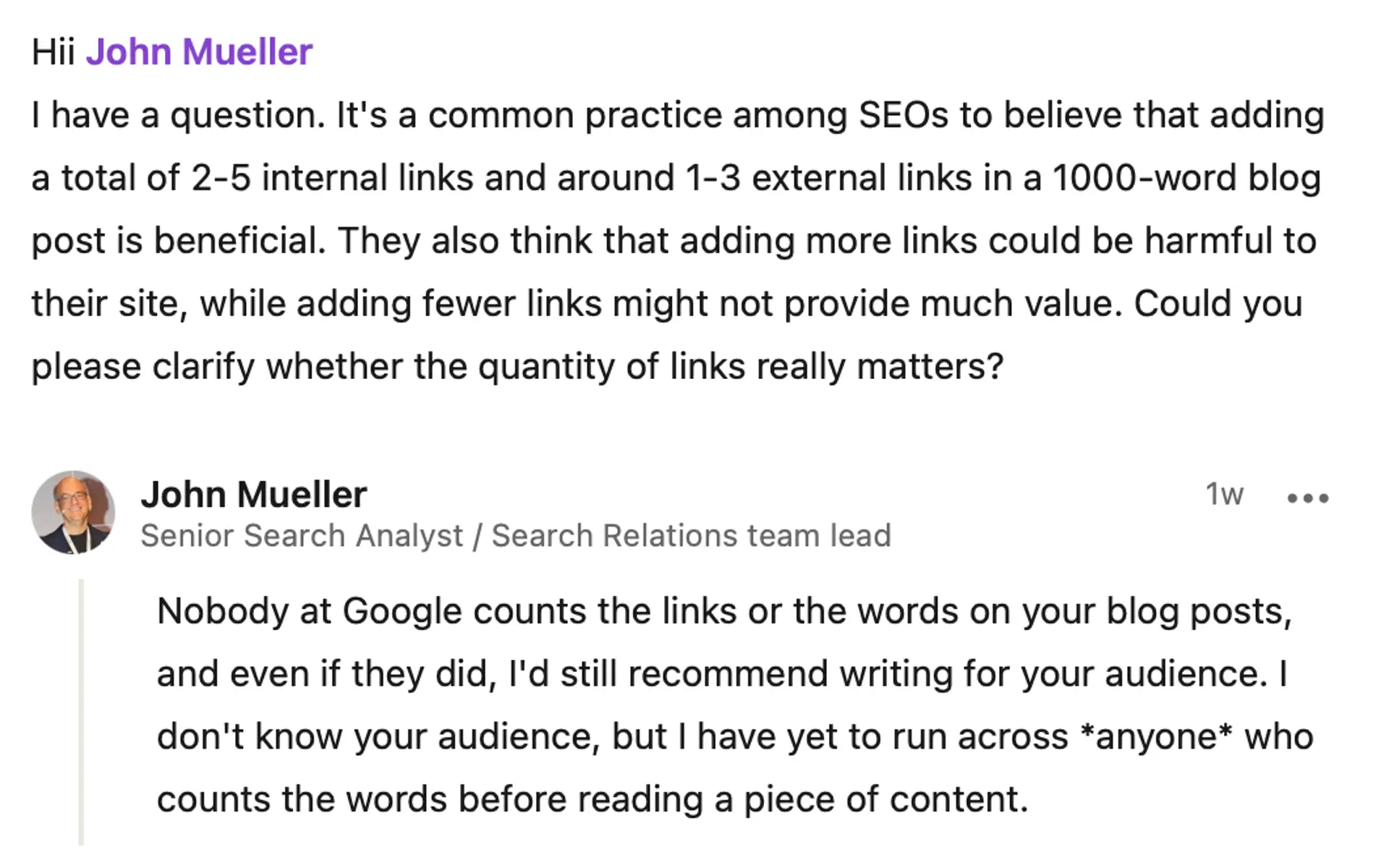Google senior analyst debunks link quantity myths in SEO practices
John Mueller of Google clarifies misconceptions about link quantities in blog posts, emphasizing content quality over metrics.

John Mueller, Senior Search Analyst and Search Relations team lead at Google, this week addressed a common misconception in the search engine optimization (SEO) community regarding the optimal number of links in blog posts. Mueller's response came after Batinder Singh, a self-described "SEO Noob," posed a question on a professional networking platform about the prevalent belief among SEOs that a specific range of internal and external links in a 1000-word blog post is beneficial for search rankings.
Singh's inquiry highlighted a widespread practice in the SEO industry where practitioners often adhere to strict numerical guidelines for link inclusion. The question specifically mentioned the belief that adding 2-5 internal links and 1-3 external links in a 1000-word blog post is considered optimal. Furthermore, Singh noted that many SEOs believe exceeding these numbers could potentially harm their site's performance in search results, while using fewer links might not provide sufficient value.
Mueller's response to this query was both direct and illuminating. He stated unequivocally that nobody at Google counts the links or words in blog posts. This statement challenges a fundamental assumption held by many in the SEO community who have long believed that such metrics play a crucial role in how Google's search algorithms evaluate and rank content.
The senior analyst's comments shed light on Google's approach to content evaluation, which appears to be far more nuanced than simply tallying links or word counts. Mueller emphasized that even if such counting were to occur, his recommendation would still be to focus on writing for the intended audience. This advice underscores Google's long-standing emphasis on content quality and relevance over technical optimization tactics.
Mueller's response also touched on a broader issue in content creation and consumption. He pointed out that in his experience, he has never encountered anyone who counts words before reading a piece of content. This observation challenges the notion that content length, often considered a key factor in SEO strategies, is as important to readers as some SEO practitioners believe it to be.
The implications of Mueller's statements are significant for the SEO industry. For years, many SEO professionals have operated under the assumption that adhering to specific numerical guidelines for links and word counts could give their content an edge in search rankings. This belief has led to the development of various SEO tools and practices designed to optimize content based on these metrics.
However, Mueller's comments suggest that such practices may be misguided. Instead of focusing on arbitrary numbers, content creators and SEO professionals might be better served by prioritizing the needs and interests of their target audience. This approach aligns with Google's broader mission to provide users with the most relevant and valuable content in response to their search queries.
It's important to note that Mueller's statements do not negate the value of internal and external linking in content. Links continue to play a crucial role in helping users navigate websites and discover related information. They also help search engines understand the structure of websites and the relationships between different pages and domains. What Mueller's comments do suggest is that the quantity of links is less important than their quality and relevance.
The conversation between Singh and Mueller also highlights the ongoing evolution of SEO practices. As search engines become more sophisticated in their ability to understand and evaluate content, traditional optimization techniques that rely on specific metrics or formulas may become less effective. Instead, the focus is shifting towards creating high-quality, user-centric content that provides genuine value to readers.
This shift presents both challenges and opportunities for content creators and SEO professionals. On one hand, it may require a reevaluation of long-held beliefs and practices. On the other hand, it opens up new possibilities for creativity and innovation in content creation, potentially leading to more engaging and valuable online experiences for users.
Mueller's insights also underscore the importance of staying informed about the latest developments in search technology and best practices. As search engines continue to refine their algorithms and evaluation methods, SEO strategies must evolve accordingly. This requires ongoing learning and adaptation from industry professionals.
The discussion initiated by Singh and Mueller's response serve as a reminder of the complexity of search engine optimization. While certain technical aspects remain important, the overarching goal should be to create content that genuinely serves the needs and interests of the target audience. By focusing on this primary objective, content creators and SEO professionals can align their efforts with the goals of search engines like Google, which ultimately aim to connect users with the most relevant and valuable information.
Key facts from the exchange
The discussion took place on August 27, 2024.
Batinder Singh, identifying as an "SEO Noob," posed the question about link quantity in blog posts.
John Mueller, Senior Search Analyst at Google, provided the response.
Mueller stated that Google does not count links or words in blog posts.
The common SEO practice of adding 2-5 internal links and 1-3 external links in a 1000-word post was questioned.
Mueller emphasized writing for the audience rather than adhering to specific link or word count metrics.
The response challenges long-held beliefs in the SEO community about content optimization.
Mueller noted he has never encountered anyone who counts words before reading content.
The exchange highlights the ongoing evolution of SEO practices and the need for adaptation in the industry.

